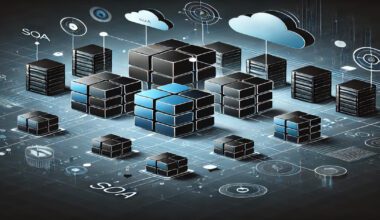Summary: This blog provides a comprehensive overview of the top cloud computing interview questions and answers, covering essential topics such as service models, security risks, and architectural components. It aims to equip candidates with the knowledge needed to succeed in cloud-related job interviews.
Introduction
Cloud computing has revolutionised the way businesses operate by providing scalable, flexible, and cost-effective solutions. As organisations increasingly rely on cloud technologies, the demand for skilled professionals in this domain continues to grow.
This blog will explore cloud computing interview questions, offering insights and answers to help candidates excel in their interviews.
Key Takeaways
- Understand the core concepts of cloud computing for better interview performance.
- Familiarise yourself with different cloud service models like IaaS, PaaS, and SaaS.
- Prepare for questions on security risks and compliance in cloud environments.
- Learn about emerging trends such as serverless architecture and edge computing.
- Practice articulating technical concepts clearly and confidently during interviews.
What is Cloud Computing?
Before diving into specific interview questions, it’s essential to understand what cloud computing is. Cloud computing refers to the delivery of computing services—including servers, storage, databases, networking, software, and analytics—over the internet (the cloud).
This allows users to access and store data remotely rather than on local servers or personal computers.
Key Benefits of Cloud Computing
- Cost Efficiency: Reduces the need for physical infrastructure.
- Scalability: Easily scale resources up or down based on demand.
- Accessibility: Access services from anywhere with an internet connection.
- Automatic Updates: Providers manage updates and security automatically.
Common Cloud Computing Interview Questions
Preparing for a cloud computing interview requires a solid understanding of key concepts and the ability to articulate them clearly. Here are 20 common cloud computing interview questions along with concise answers that can help candidates prepare effectively.
1. What Is Cloud Computing?
Cloud computing is the delivery of various services over the internet, allowing users to access and store data remotely instead of on local devices. It provides flexibility and scalability for businesses.
2. What are the Different Types of Cloud Services?
The three main types of cloud services are:
- Infrastructure as a Service (IaaS): Provides virtualised computing resources over the internet.
- Platform as a Service (PaaS): Offers hardware and software tools over the internet, typically for application development.
- Software as a Service (SaaS): Delivers software applications over the internet on a subscription basis.
3. Explain The Difference Between Public, Private, And Hybrid Clouds.
- Public Cloud: Services are delivered over the public internet and shared across multiple organisations.
- Private Cloud: Exclusive to one organisation, providing greater control and security.
- Hybrid Cloud: Combines public and private clouds, allowing data and applications to be shared between them.
4. What Is Virtualization in Cloud Computing?
Virtualization is the creation of virtual versions of physical resources like servers or storage devices. It enables multiple virtual machines to run on a single physical machine, improving resource utilisation.
5. How Does On-Demand Self-Service Work in Cloud Computing?
On-demand self-service allows users to provision computing resources automatically without requiring human interaction with service providers. This feature enhances efficiency and user control.
6. What Are Some Common Security Risks in Cloud Computing?
Common security risks include:
- Data breaches
- Data loss
- Account hijacking
- Insecure APIs
7. Explain Auto-Scaling in Cloud Environments.
Auto-scaling automatically adjusts the amount of computational resources based on current demand. It ensures optimal performance while managing costs effectively.
8. What Is Load Balancing in Cloud Computing?
Load balancing distributes incoming network traffic across multiple servers to ensure no single server becomes overwhelmed. This enhances application availability and reliability.
9. How Do Cloud Providers Ensure Data Availability and Fault Tolerance?
Cloud providers ensure data availability through redundancy—storing copies of data across multiple locations—and implementing automated failover systems that switch operations to backup systems when failures occur.
10. What Is Multi-Tenancy in Cloud Computing?
Multi-tenancy is an architecture where a single instance of software serves multiple tenants (customers). Each tenant’s data is isolated while sharing resources, leading to cost savings for service providers.
11. Describe Disaster Recovery in Cloud Computing.
Disaster recovery involves strategies and processes that enable an organisation to recover from disruptive events by restoring IT infrastructure and operations quickly using backup data stored in the cloud.
12. What Are Apis, And Why Are They Important in Cloud Services?
APIs (Application Programming Interfaces) allow different software applications to communicate with each other. In cloud services, APIs enable integration between various applications and facilitate automation.
13. Explain What a Virtual Private Network (VPN) Is in The Context of Cloud Computing.
A VPN creates a secure connection over a public network by encrypting data traffic between users and their destination servers in the cloud, enhancing privacy and security during data transmission.
14. What Is Data Sovereignty?
Data sovereignty refers to the concept that data is subject to the laws of the country where it is stored. This impacts how organisations manage their data in compliance with local regulations when using cloud services.
15. How Do You Ensure Compliance in Cloud Services?
Ensuring compliance involves adhering to regulations relevant to your industry (such as GDPR or HIPAA), implementing robust security measures, conducting regular audits, and maintaining clear documentation of policies and procedures.
16. What Are Containers, And How Do They Relate to Cloud Computing?
Containers are lightweight virtual environments that package applications with their dependencies, allowing them to run consistently across different computing environments. They enhance deployment speed and resource efficiency in cloud settings.
17. Describe What Serverless Architecture Means.
Serverless architecture allows developers to build applications without managing server infrastructure directly. Instead, they deploy code that runs in response to events while automatically scaling based on demand.
18. What Role Does Encryption Play in Cloud Security?
Encryption protects sensitive data by converting it into a code that can only be read by someone with the decryption key. It safeguards data both at rest (stored) and in transit (being transmitted).
19. How Can You Monitor Performance in a Cloud Environment?
Performance monitoring can be achieved through various tools that track metrics like CPU usage, memory consumption, response times, and application performance across different instances within the cloud infrastructure.
20. What Are Some Emerging Trends in Cloud Computing?
Emerging trends include:
- Increased adoption of Artificial Intelligence (AI) within cloud services.
- Growth of edge computing for processing data closer to its source.
- Expansion of hybrid and multi-cloud strategies among organisations.
- Enhanced focus on sustainability practices within cloud infrastructures.
Conclusion
Preparing for an interview in cloud computing requires familiarity with key concepts, terminology, and current trends within the industry.
By understanding these common cloud computing interview questions, candidates can confidently demonstrate their knowledge during interviews, increasing their chances of securing positions within this dynamic field.
As businesses continue embracing digital transformation through cloud technologies, skilled professionals will remain essential for driving innovation and efficiency across sectors.




